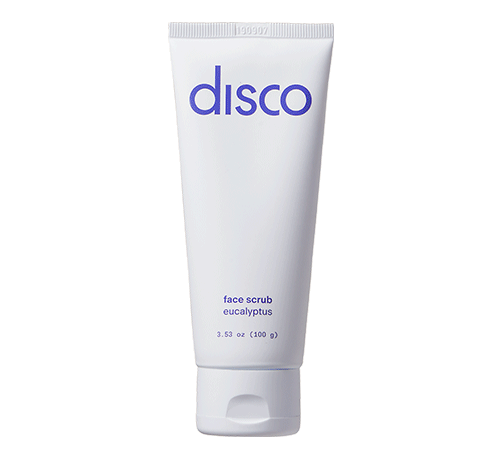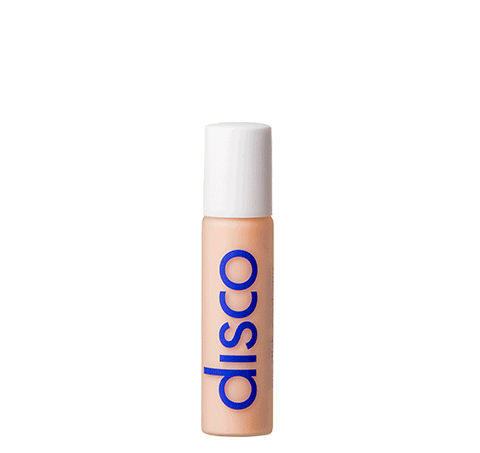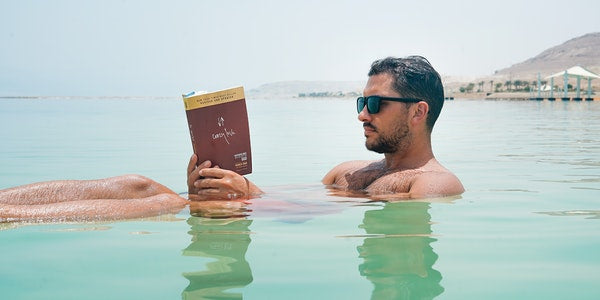If you’re reading this, you’re either burned to a crisp or sunscreen curious. Either way, welcome to the party. You’re about to deep dive into everything you’ve ever wanted (or not wanted) to know about how men’s skin works, how the sun affects it, and which sunscreens work best for your skin.
Not wearing sunscreen means a whole lot more than just getting the occasional, painful burn. The lasting effects of sun damage get carried into every new decade and can make your skin look older than you actually are.
To better understand what the sun can do to your skin, you first need to know a little about what's going on under the epidermis.
Men’s Skin 101
Men have skin too, but if you shop your local drugstore for men’s skincare products, you’ll find way less available than products marketed to women. Sometimes, products marketed to men aren’t even formulated for our skin.
Companies regularly create products for use on women’s skin and market them to men simply by switching the label or removing a rose scent and replacing it with pine, as if we’re that easily fooled.
Okay, sometimes we are, but the fact remains these products usually never work, and there’s a good reason: male skin is different from female skin.
Men’s Skin Has a Different pH Balance
The pH balance of a substance is the measure of how acidic or alkaline the substance is. The scale runs from 1-14—the lower the pH scale, the more acidic the substance.
For instance, battery acid has a pH of 1. Drain cleaner has a pH balance of 14. Water is 7, placing it right in the middle, which makes it neutral.
The perfect pH balance of a man’s skin is 5.5-6.5, which makes it more alkaline than women’s skin, which is balanced between 4.5 and 5.5.
Products geared to women focus on keeping women’s skin in that slightly acidic range. These products don’t work well for men’s skin because they work against our natural pH balance.
Men’s Skin Grows Facial Hair
Men grow facial hair, which makes the structure of their skin different from women’s. This has benefits and setbacks. Facial hair (if you grow it out) can act as a natural sun protectant that might even protect you from photoaging.
Facial hair is sturdy and can help give the skin on your face more support, which can prevent the onset of early sagging. In terms of fine lines and wrinkles, areas of your skin that are covered with facial hair tend to wrinkle less.
Sounds great, right?
Grow a beard and keep your skin looking more youthful. However, other not-so-great skin issues go hand-in-hand with the ability to grow facial hair. Ingrown hairs, razor burn, and skin irritation are common problems that men deal with constantly from puberty through adulthood.
Men’s Skin is Thicker Than Women’s
Men’s skin is naturally thicker than women’s because of the presence of testosterone. Because our testosterone levels are higher, men’s skin is typically 20-25% thicker than women’s. It’s also more collagen-rich, meaning it’s less likely to show the visible signs of aging as quickly as a woman’s.
Men’s Skin is Oilier Than Women’s
Sebum is the natural oil your skin produces to lubricate your skin, and men’s skin produces double the sebum that women’s skin produces. That means that products targeted to reduce oil and shine in women simply won’t be effective for us because they aren’t strong enough.
Our skin is also more porous, and our pores tend to be larger, which means we are more likely to deal with breakouts and blemishes.
How Men’s Skin Burns
Men’s skin may be more sensitive than women’s. Studies are ongoing, but research has shown that male skin may contain less antioxidants than women. Antioxidants protect our skin against free radicals, and the sun is one of the strongest sources of free radicals.
How the Sun Affects Men’s Skin
Just because your skin is thicker than women’s skin doesn’t mean it won’t still burn or show visible signs of photoaging. Here’s a breakdown of what happens to your skin if you don’t wear sunscreen.
You’ll Be Exposed to Ultraviolet Rays
The sun gives off three different types of rays: UVA, UVB, and UVC rays. These rays are damaging to your skin and responsible for increasing your risk of skin cancer.
UVC rays are the most damaging but are absorbed by the upper layers of the atmosphere before they ever reach the earth’s surface. UVA rays cause the visible signs of sun damage, and UVB rays are linked to skin cancer (although they too cause your skin to age faster than it has to).
Sunscreen helps protect you against these rays, so if you aren’t wearing it, you’re essentially telling the sun to bring the damage.
You’ll Experience Photogaing
Photoaging refers to the visible effects of sun damage on your skin. This includes:
- Skin sagging due to loss of collagen and elastin
- Fine lines
- Deep wrinkles
- Hollows on the cheeks and under the eyes
- Leathery, rough texture
- Sunspots and freckles
You might not notice these effects until you’re older, but the sun exposure you receive now has a cumulative impact on your skin. If you don’t wear sunscreen to protect your skin, you’ll end up with leathery, worn skin that looks a decade older than your actual age.
You’ll Get a Sunburn
It basically goes without saying that if you stay in the sun too long, you’re going to get a sunburn. But a sunburn does more damage than just making you red and uncomfortable.
Getting just five or more sunburns in your entire lifetime doubles your risk of developing melanoma, the deadliest form of skin cancer.
You Could Get Skin Cancer
Skin cancer is more prevalent in men than women. Men are also more likely to develop melanoma than women. It gets worse. According to the American Academy of Dermatology, men are more likely to become at risk of developing melanoma than women.
Even if you don’t develop melanoma, you could develop a basal cell carcinoma or squamous cell carcinoma. The best-case scenario for either of those skin cancers is removing the spot, which will likely leave you with a sizable scar.
Do Men Really Need Sunscreen?
The answer is a resounding yes, and you need to wear it daily.
Every dude older than six months should be wearing high-quality sunscreen, even if you feel you aren’t in the sun much. You can get sun exposure even when you drive in your car or work by a window.
Fortunately, you probably don’t need to wear anything higher than an SPF 30 on a daily basis. Even if you’re in the sun, dermatologists recommend SPF 30 applied properly to give your adequate sun protection.
To properly apply your sunscreen, you need to use about an ounce to cover every area of your body exposed to the sun. If you’re in direct sunlight, you’ll need to reapply as directed on the package. Additionally, if you sweat or get in the water, you’ll need to reapply.
Which Sunscreen is Best for Men?
There are two different types of sunscreen available to give you protection against harmful UV rays: chemical and physical. Which is best for men? Let’s find out.
Chemical Sunscreen
Chemical sunscreen contains chemicals that absorb UV rays and turn them into harmless heat waves. Your skin then releases these heat waves. The chemicals most commonly used in chemical sunscreens are oxybenzone, avobenzone, octisalate, octocrylene, homosalate, and octinoxate.
While these chemicals effectively shield your skin from the sun, they also come with some pretty unpleasant side effects. For instance, octisalate makes your skin more absorbent, which means any other ingredients in your sunscreen will be more easily absorbed into your skin.
Additionally, the chemicals in these types of sunscreens have been shown to remain in the bloodstream and tissues of users weeks after they discontinued using the products.
There are definitely better options, and physical sunscreen is the place to start.
Physical Sunscreens
Physical sunscreens work differently than chemical sunscreens. Instead of absorbing UV rays and chemically reacting with them, physical sunscreens deflect UV light when it touches your skin.
The two most popular physical sunscreens are titanium dioxide and zinc oxide. Zinc oxide is generally better tolerated, better for your skin and body, and has a broader UV protection spectrum than titanium oxide.
You can get the protection of zinc oxide in Disco’s Moisturizing Mineral Sunblock. Our sunblock contains clean ingredients that help give you coverage while simultaneously keeping your skin hydrated and working to reverse and repair the effects of previous sun exposure.
Also, our sunscreen won’t ever leave you looking pasty. Our formula rubs in easily and absorbs quickly, so you never have a white cast on your skin.
Our sunscreen includes:
- Zinc oxide. A natural, safe ingredient that physically protects you from the sun’s most damaging rays without irritating your skin or clogging your pores.
- Tripeptide. Tripeptide helps repair skin that has been damaged by the sun by rebuilding the dermal structure and stimulating collagen production.
- Niacinamide. This derivative of vitamin B3 helps reduce the appearance of fine lines and wrinkles while simultaneously helping problematic skin see less breakouts. Niacinamide is also great for correcting your skin tone and bringing back its balance.
What you won’t find in our sunscreen are any harsh chemicals that irritate your skin or harm your body. Because using something for protection that ends up hurting you, in the end, makes zero sense.
The Takeaway
No matter your age, you need to wear sunscreen, man. Men’s skin is sensitive to the sun, and we develop life-threatening skin cancers at a rate much higher than women’s. Disco≈’s mineral sunblock makes it easy for you to add sun protection to your daily routine.
Sources:
Solar Protection Provided by Beards | Academic
What Is the Difference Between Male and Female Skin? | Dermatology Associates







